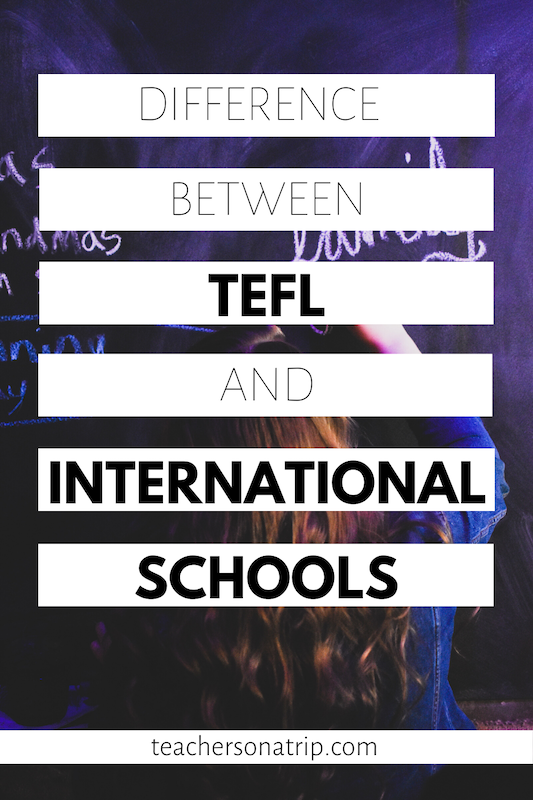
What is the Difference Between TEFL and International Schools?
When I first started looking for ways to teach abroad, I did as most new learners do: I Googled it. I was immediately flooded and overwhelmed by different TEFL options. This post is not meant to discount TEFL programs, because I truly think they are a great option. But they were not a good option for us. We needed to find international schools where we could teach English-speaking students in a similar format that we would in the US. But it took me a year to find that information. Why? Because I didn’t know the difference between TEFL and international schools. So if you are in the same boat as we were, allow us to help you out!
What is TEFL?
TEFL stands for Teaching English as a Foreign Language. Of course there are about a billion different TEFL-related acronyms, but this is one that you will come across most often. In order to become a TEFL teacher, you would need to obtain your TEFL certification, even if you are already a certified teacher.
This is one thing that I could not wrap my head around when I started researching. If I’m already a certified teacher, why would I need to get another certification to be able to teach? Well, your TEFL certification allows you to teach the English language to non-native speakers. That is an incredibly difficult job that requires learning many different strategies to teach. So in a TEFL certification course, you will learn how to teach English language skills like pronunciation, grammar, vocabulary, reading, writing, speaking, and listening. You will also learn how to plan lessons, manage a classroom, work with different learning styles, create and use materials to help learning, and simplify tough concepts.
Please remember that with your TEFL certification, you would be teaching non-native English speakers. Each school across the world may be different. TEFL teachers can work in local public schools, private schools, or even as private tutors outside of a school.
Where Can I Get My TEFL Certification?
There are so many different TEFL courses out there. I recommend always finding one that is accredited and at least 120-hours. Anything less, and your potential employers may choose someone with more experience and training. Here is a list of my personal favorite TEFL certification courses.
Some of these companies have both in-person and online TEFL Certification programs, so feel free to pick whichever works best for you and your needs!
ITTT– 5% discount through this link
Maximo Nivel– If you sign up here, be sure to mention that Teachers on a Trip sent you!
All of these companies are 100% real (which can’t be said for them all), and they also will let your employer know that you took your training seriously. If you’re interested in learning more about securing your spot as a TEFL teacher, check out my online course The Beginner’s Guide to Teaching Abroad. I go through every pro and con of these TEFL companies and give you every piece of advice to become the front runner and land a spot in your dream school!
Who Can Be A TEFL Teacher?
Anyone with a bachelor’s degree, as long as you obtain your TEFL certification.
What is an International School?
International schools are very similar to a traditional style school in the US, UK, or Australia. Elementary teachers would be responsible for teaching math, science, reading, writing, social studies, etc. Whereas, middle school through high school are departmentalized and typically teach one subject. Each school has the ability to choose their curriculum. Some international schools follow American curriculum, while other follow British curriculum. Occasionally, you might find a school that follows curriculum from a different country, but most of the time it is split between the US or UK for international schools.
The students are mostly native English speakers. Of course, there is always the possibility of a few ELL students, but they receive services through the school. So it is not the homeroom teacher’s job to “teach English” to that student.
Many international schools are private which require parents to pay a tuition. Because the school receives tuition, many international schools have fully-resourced classrooms. Our own personal school is stocked with everything we need to teach our lessons. If there is something that we need, we can put in a request and most of the time it is honored and will be delivered to us. Some international schools are considered public schools, and they typically receive their funds through the government. The funds from public schools are completely reliant on how the government views the education system.
Who Can Be An International Teacher?
Any teacher certified in education.Interested in learning how you can start your path to becoming an international teacher? Check out The Beginner’s Guide to Teaching Abroad. It’s a step-by-step online course that walks you through every aspect of getting a job overseas. I teach you different methods of how to find international teaching jobs, apply to them, and land a job in your dream school.
Related Articles: Should I Teach Abroad?, Teaching Abroad in Grand Cayman, Why You Should Teach Abroad, Myths About Teaching Abroad
I hope this helped you understand the difference between TEFL and international schools. If you are interested in learning more about how to teach abroad and get into the best schools (for both TEFL and international), then please download our free video below! We look forward to seeing you soon!

